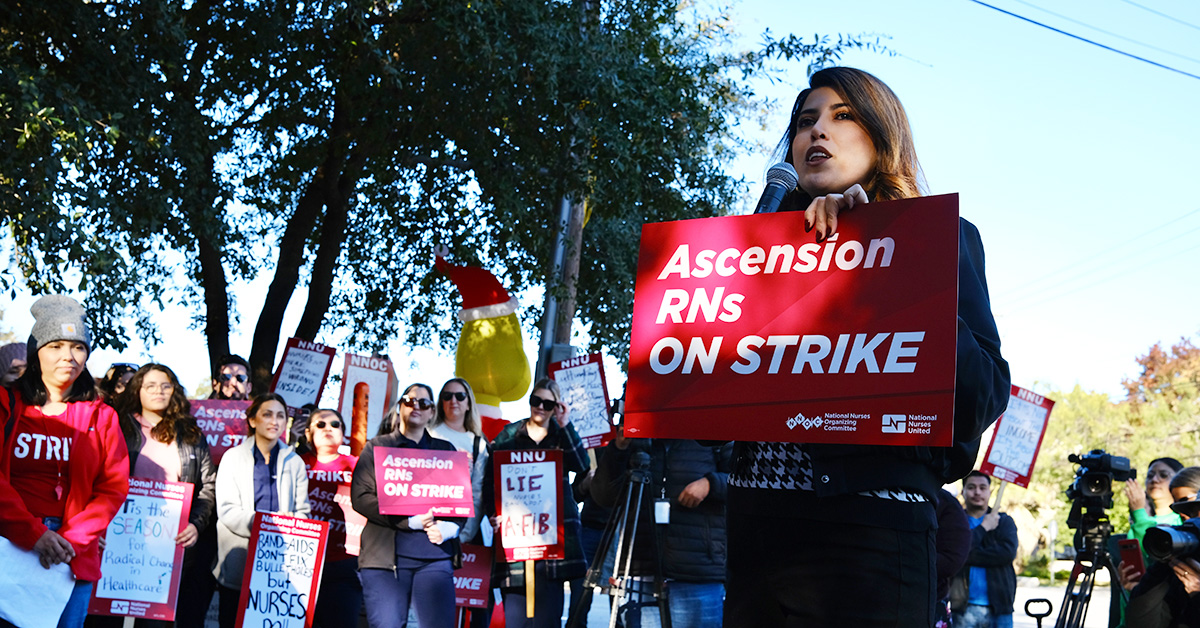Ascension nurses strike in Austin and Wichita

Nearly 2,000 RNs strike in June and December
By Lucy Diavolo, Michelle Morris, and Chuleenan Svetvilas
National Nurse magazine - Oct | Nov | Dec 2023 Issue
Nearly 2,000 registered nurses in Texas and Kansas at three Ascension hospitals — Ascension Via Christi St. Joseph Hospital and Ascension Via Christi St. Francis in Wichita and Ascension Seton Medical Center Austin (ASMCA) — held historic one-day strikes in June to protest management’s resistance to bargain in good faith with RNs for union contracts that would help correct the endemic staffing crisis. Driven by their concerns about patient safety, the strikes were the largest nurses strikes in Texas and Kansas history.
The strikes came after Ascension repeatedly dismissed nurses’ solutions for patient safety during contract negotiations, including their proposals to enforce safe staffing and improve nurse recruitment and retention. Nurses refuse to accept the constant short staffing and the hospital’s inability to recruit and retain qualified staff as a result of its bad practices.
“Ascension management is shortchanging its nurses and its patients,” Nichlous Whitehead, an RN in the surgery unit at St. Francis Hospital, said of the hospital chain, which does not pay federal taxes because of its nonprofit status. “While Ascension claims to provide ‘spiritually-centered holistic care,’ nurses’ experiences reflect the reality of Ascension’s hypocrisy. Union nurses are striking to enforce, through safe staffing protections in our contracts, Ascension’s own mission to ‘sustain and improve the health of individuals and communities.’”
In the past year, Ascension nurses have made history, creating some of the largest private-sector nurse unions in states with laws hostile to worker organizing. Driving the surge of unionization at Ascension is the blatant hypocrisy of the nonprofit, Catholic hospital chain – one of the nation’s largest that has $19.5 billion in cash reserves, an investment arm that manages $41 billion, and a private equity operation worth $1 billion.
“Nurses are patient advocates at the bedside and, when we need to be, on the strike line,” said Carol Samsel, an RN in the intensive care unit at St. Joseph Hospital. “Union nurses are ready to stand united against these conditions, which are driving away both veteran nurses, whom we need to ensure the highest standards of care, and new graduates, who are necessary for the sustainability of our profession.”
The latest data from the Bureau of Labor Statistics and the National Council of State Boards of Nursing shows that in Texas, Kansas, and across the country, there is no nurse “shortage.” In fact, in Texas, there are nearly 128,000 registered nurses with active licenses who are choosing not to work at the bedside, while in Kansas – a much smaller state by population – that number is almost 20,000. Nationwide, there are more than a million registered nurses with active licenses who are choosing not to work at the bedside because of the hospital industry’s unsafe working conditions.

Nurses strike in December
RNs at the same three Ascension hospitals went on strike for 24 hours in December to protest unsafe conditions management has failed to remedy.
The RNs are bargaining their first union contracts. Throughout bargaining, nurses have emphasized the importance of finding solutions for safe staffing and nurse recruitment and retention, which are critical factors for ensuring patient safety. In December, they held strikes to specifically call attention to:
Equipment issues: At ASMCA, there is a lack of functional IV pumps, hospital gowns, blankets, and thermometers, as well as persistent problems with hospital-issued phones that nurses use during their shift for communication.
Staffing issues: In Wichita, at St. Francis and St. Joseph hospitals, management’s unsafe ‘floating’ policy means nurses are assigned to units where they do not usually work and may not have the training or expertise to care for those patients. In Austin, at ASCMA, management is proposing that labor and delivery nurses with as little as 18 months of experience be assigned to ‘charge’ roles, which are typically given to experienced nurses in safely-staffed hospitals as they are responsible for the smooth functioning of their units and act as resource nurses.
“We are constantly running out of clean hospital gowns, thermometers, and even blankets for newborn babies,” said Taylor Critendon, RN in the intermediate care unit at ASMCA in Austin. “We are also dealing with broken IV pumps and hospital-provided phones are often not working properly, which can delay vital communications between staff in situations where timely intervention is crucial. Ascension should use its vast resources to invest in the equipment we need to care for our patients. Then we don’t have to spend the time we should be caring for our patients hunting for essential supplies and working equipment.”
“We are striking because management continues to float nurses to units where they do not usually work and where they do not necessarily have expertise or experience,” said Lisa Watson, a medical ICU RN at Ascension Via Christi St. Francis in Wichita. “You wouldn’t send a cancer patient to a pediatric doctor so why would you send a pediatric nurse to work in oncology? But this is what Ascension is doing with nurses at St. Francis. We want to ensure that nurses are only assigned to units where they have expertise.”
After each strike in June and December, Ascension management locked out nurses for three days, preventing them from returning to work. The RNs condemned that decision by management as an apparent ploy to intimidate nurses from speaking out against the conditions driving their decisions to strike.
“By locking nurses out for three days, Ascension is sending the message, once again, that providing patients with excellent care is not their priority,” said Kris Fuentes, RN in the neonatal ICU at ASMCA in Austin. “As nurses, we are very focused on our patients and winning a contract that sets the stage for optimal care. It is high time for management to prioritize patients and reach an agreement that accomplishes this.”
Lucy Diavolo, Michelle Morris, and Chuleenan Svetvilas are communications specialists at National Nurses United.